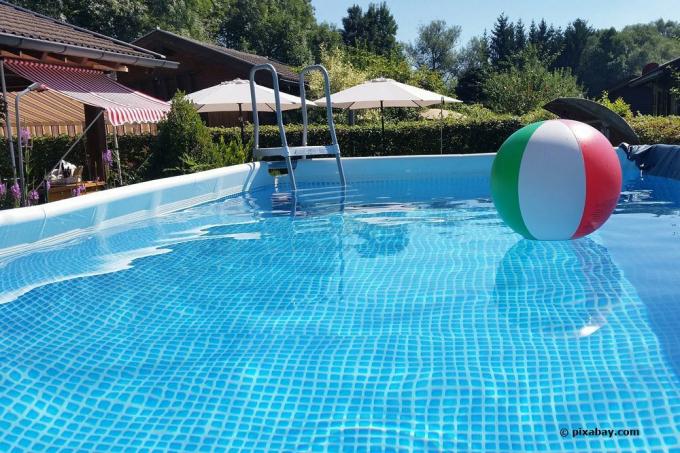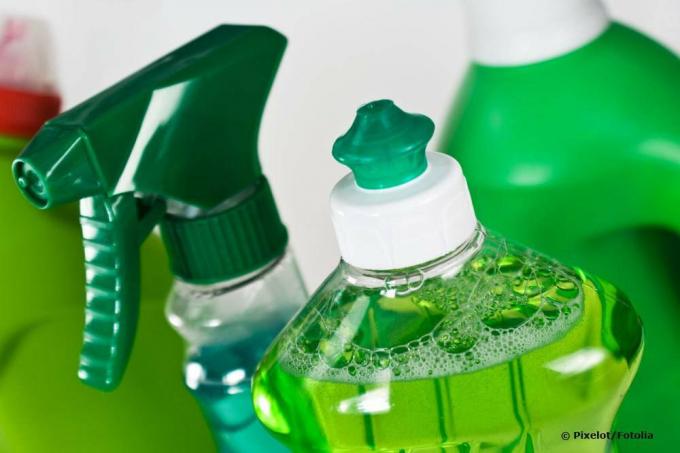
table of contents
- Eliminate mosquito larvae in the water?
- Prevent
- Rain barrel
- Empty the water tank
- control
- pool
- Fight mosquito larvae in the rain barrel: Instructions
- Home remedies
- 1. Biodegradable detergent
- 2. Vegetable oil
- Killing mosquito larvae in the garden pond: instructions
Mosquitoes are one of the biggest nuisances over warm summers. The small bloodsuckers multiply rapidly and are difficult to fight as soon as they are adult specimens. Because of this, the mosquito larvae must be killed before they can grow into stinging adults. So you have to kill the larvae directly in the water, especially in the rain barrel and the garden pond, as these are often used as a place to lay eggs.
Eliminate mosquito larvae in the water?
Mosquitoes are one of the insects that reproduce via eggs in stagnant water after a female mosquito has deposited them there. For the Egg laying Not only is fertilization by male mosquitoes, easily recognized by their bushy antennae, required, but also the blood of other animals, especially mammals. If the eggs were laid in the water, they hatch after three days and the larvae are fully grown after about three weeks. Mosquito larvae cannot defend themselves or escape because a rain barrel or garden pond is limited. So you have
three weeks Time to effectively control the larvae and stave off a mosquito plague.
Prevent
The best thing you can do about the mosquito larvae is to prevent them from laying their eggs. The fewer opportunities you offer the female mosquitoes to lay eggs, the fewer larvae you have to kill in the end. You have to focus particularly on the availability of standing water sources Pay attention, as these are perfect for the larvae. These include:
- Rain barrels
- garden pond
- puddles
- Bowls or other containers that fill up when it rains
- clogged gutters
- Pools
You don't have to worry about drinking bowls for dogs or other animals. These are used, refilled and cleaned so often that the eggs cannot hatch there. When preventing, follow the points below to protect your garden, especially your rain barrel, from the insects as much as possible:
Rain barrel
Rain barrels can easily be covered with fly nets or special mosquito nets. These prevent the animals from getting into the barrel and laying their eggs there. In most cases, a lid is not sufficient for this, as the bloodsuckers can get into the gutter via the rain gutter. In itself it is sufficient if you cover the open bin with a grid and fix it with a string. If the downpipe reaches into the bin, a hole is cut in the mosquito net, the end of the downpipe is covered with insect screen and the pipe is put back into the bin through the hole.
If you do want to use a lid, you should make sure to keep it closed. Likewise, the lid must not have a hole for the rain gutter, as the insects can easily get through this into the interior of the bin. Only open the bin when it is raining and keep the lid closed in dry and especially humid weather. This will reduce the chance that mosquitoes will end up in the bin
Empty the water tank
Periodically pour out other containers of collected water. It is best to store them in such a way that no water can collect, for example in the shed. Make sure to always use up your watering can completely, because the mosquitoes will also be able to lay their eggs there. If you have any water left over after watering, it is best to pour it back into the bin immediately. Since watering cans are usually moved during use, mosquitoes avoid them when laying their eggs.
control
From April or May, at the latest when the temperatures are between 18 ° C and 20 ° C, regularly check your bins for egg packages. If you discover an accumulation of eggs, it is best to scoop them up with a fine-meshed net. This method is complex but effective and must be carried out throughout spring through autumn. You can even use a large net such as a pool net, as these are perfect for this. But watch out for the other residents if you use the net for the pond.
Of course, you can always empty your bin if you spot eggs. However, the waste of water is quite high and in the end it is not worth it at all.
pool
You can easily get larvae in the pool by adding chlorine counteract. The agent prevents the eggs from developing and thus the insects cannot even hatch. If you prefer a natural pool, i.e. without chlorine, you should definitely make use of your pool net and tarpaulin. When you're not in the water for a long time, just cover it up and you won't have to worry about mosquito eggs anymore.
Refrain from covering garden ponds with fly screens, even when the days are muggy. This could disrupt the natural cycle of the residents. Garden ponds cannot be protected from the mosquitoes unless the surface of the water is constantly in motion. Nevertheless, the tips above will help to significantly reduce the number of mosquito larvae without wasting valuable water. However, if you want to control mosquito larvae that have already hatched, you will have to resort to tougher means.

tip: Also pay attention to the saucers of your flower pots and tubs when you prevent. These can fill with water and thus enable eggs to be laid.
Fight mosquito larvae in the rain barrel: Instructions
Rain barrels are most often chosen by pests as a breeding ground, especially when there is no pond or other body of water nearby. Because of this, you need to Home remedies to fight the larvae so that they are not covered with stings over the summer. There are two home remedies that you may already have at home and can use immediately:
Home remedies
1. Biodegradable detergent
If you use organic washing-up liquid, for example from the following companies, you have an effective home remedy for mosquitoes on hand:
- Ecover
- So nice
The detergent lowers the surface tension and suffocates the mosquito larvae. Just a few drops are enough for this. The advantages of biodegradable detergent are the ingredients. These do not have a negative effect on plants, animals and microorganisms and the detergent water can even be used for watering afterwards.
tip: Do not use detergent with ingredients such as B. Orange oil. This is poisonous for aquatic organisms and plants and is difficult to break down.
2. Vegetable oil
Vegetable oil also has an effective effect on the surface tension of the water, but ensures that the mosquito larvae suffocate even more quickly. You can use all types of oil for this, from olive to canola to sunflower oil. To do this, proceed as follows:
- only use the oil on barrels that are not in direct sunlight
- Since oil floats on the surface of the water, exposure to the sun makes it rancid
- add 2 - 3 tablespoons to the water
- stir the surface a little so that the oil spreads even better
- After the mosquitoes have died, skim off the oil and the "mosquito corpses"
The detergent is recommended of both variants, as you do not have to skim it off and it has no side effects as long as it is biodegradable.
Killing mosquito larvae in the garden pond: instructions
Neither vegetable oils nor detergents may be used to kill mosquito larvae in the pond, even if they are biodegradable. The reason for this are the side effects such as the foaming of the detergent, which could have negative effects on the pond inhabitants. For garden ponds are therefore exclusively specific which are based on natural proteins that are fatal to mosquito larvae. These proteins do not pose a threat to fish, mammals, plants, birds, other insects and various microorganisms and are used, among other things. a. offered by the following companies:
- Neudorff: 12 to 15 euros for 10 tablets
- Culinex: 18 to 20 euros for 10 tablets
The duration of action of one tablet is sufficient for about four weeks. In other words, with one pack you can cover the whole year, depending on the size of the body of water. Normally, one tablet is used for 1,000 liters of water. Just throw them into the garden pond and the active ingredients will kill the larvae. Be careful, however, that your mucous membranes do not come into direct contact with the tablet. Your eyes in particular could be seriously damaged.

tip: You can use the protein supplements in the bin without any problems, as they can be used in natural and man-made bodies of water or containers filled with water. Just dose according to the dosing instructions.


